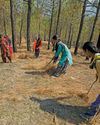
IN APRIL, tea planters from southern India sought urgent government intervention, saying that the tea mosquito bug is causing havoc in the most unlikely places. The bug, recognised as a serious pest of fruits and tea plantations across the world, is usually confined to low elevation areas. Now, it is spreading to plantations in high elevation areas. The United Planters Association of Southern India (UPASI) has issued a press release that states the tea mosquito bug (species of Helopeltis) is affecting tea production in both low and high elevation plantations in northern and southern states. The extent of damage can be seen in Tamil Nadu's Valparai hills, where tea production has declined by 50 per cent from 30 million kg in 2009-10 to 16.73 million kg in 2021-22. Furthermore, affected tea estates are spending over 12,000 per hectare (ha) on pesticide application every year, but to no avail.
While UPASI has sought government approval for the use of some new pesticides in tea plantations to curb the spread of the bug, the measure can, at best, be a myopic solution. The fact is that the tea mosquito bug and several other plant pests are expanding their territory and becoming more infectious in a warming world.
Helopeltis theivora, the most predominant tea mosquito bug species in India, is spreading in an alarming form in tea plantations of Tamil Nadu's Anaimalai and Valparai hills. Sikkim has recorded the first infestation of H theivora in red cherry pepper, write researchers from Bidhan Chandra Krishi Viswavidyalaya, West Bengal, in the Journal of Plant Health Issues in June 2020. H bradyi, which has so far been restricted to Peninsular India, was reported for the first time on the high altitude Tura region of Meghalaya. H antonii, which causes damage to cashew crops, is now being reported in Gujarat, Chhattisgarh and Odisha, the authors note.
This story is from the {{IssueName}} edition of {{MagazineName}}.
Start your 7-day Magzter GOLD free trial to access thousands of curated premium stories, and 9,000+ magazines and newspapers.
Already a subscriber ? Sign In
This story is from the {{IssueName}} edition of {{MagazineName}}.
Start your 7-day Magzter GOLD free trial to access thousands of curated premium stories, and 9,000+ magazines and newspapers.
Already a subscriber? Sign In

THE CIRCULARITY ARGUMENT
A circular economy can help India achieve its developmental aspirations while following the low-carbon pathway. It will also help address the challenges of waste management, pollution and overexploitation of natural resources. Industries are already innovating to reuse high-volume wastes and have shown that the transition can usher in both environmental and financial windfalls

Banking on flawed drug voluntary licences
The Medicines Patent Pool is pushing for more VLs, but its bad deal with Novartis on a cancer drug shows the pitfalls

Lasting solutions
For the first time, the UN has recognised the role of indigenous communities in tackling aridity. A repository of traditional knowledge India has the wherewithal to lead the way

IMD at 150
India's journey into modern weather forecasting took a decisive turn 150 years ago with the establishment of India Meteorological Department during the British rule. The agency has come a long way since then, shaping the way the country predicts and responds to its diverse climate challenges

Every drop counts
In drought-prone Marathwada region, 14 villages have managed to counter water shortage by budgeting the resource

Threat to survival
Hollongapar Gibbon Sanctuary in Assam faces ecological challenges as railway electrification and hydrocarbon exploration endanger its fragile biodiversity

'Migration is going to be a battlefield'
AMITAV GHOSH is one of the foremost chroniclers of our times. His literary sojourn includes writings on topics that range from languages to climate change to human lives. His latest book, Wild Fictions, brings some of his works on these issues under one title. In a conversation with RAJAT GHAI, Ghosh shares his views on the future of human movement. Excerpts:

Face of future
California wildfires confirm forest fires are intensifying in a hotter world, emitting substantial amounts of greenhouse gases and reinforcing global warming

Friends of the forest
Residents of 30 villages in Uttarakhand establish a model for public participation in saving forests from wildfires

Climate-crazy playbook
Just hours after his second (and final) term began on January 20, US President Donald Trump unleashed 46 presidential actions. Several of these are centred on the US' climate commitments, energy transition, migration and trade policies, and are likely to have negative global implications